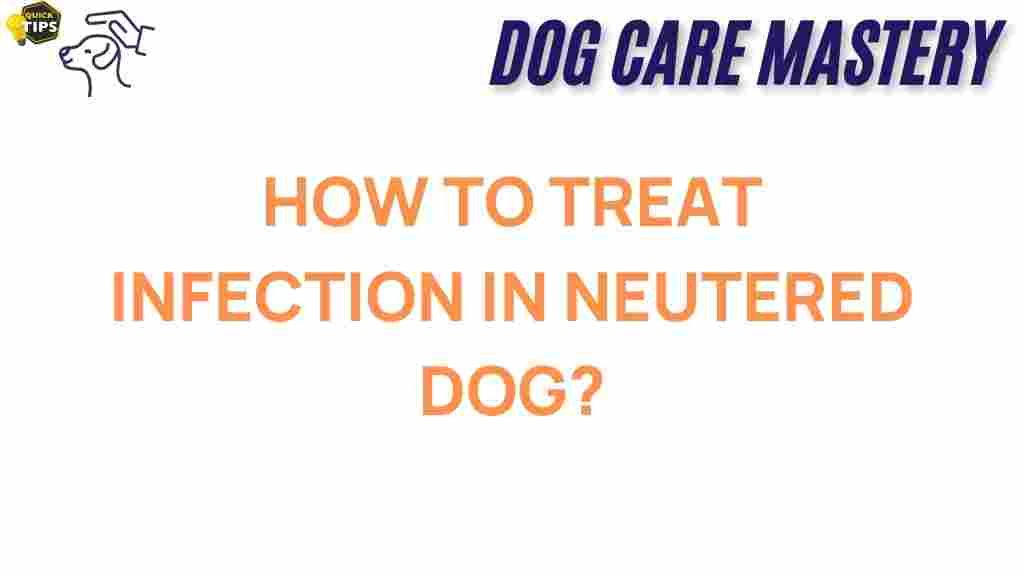How to Effectively Treat Infection in Neutered Dogs
Neutering your dog is a significant step towards responsible pet ownership. While it has many benefits, including reducing the risk of certain health issues, neutered dogs can still be susceptible to infections. Understanding how to effectively treat infections in neutered dogs is crucial for pet owners who want their furry friends to lead healthy lives. This article provides essential insights into recognizing and treating infections in neutered dogs, ensuring your pet receives the care it needs.
Recognizing Infection in Neutered Dogs
The ability to quickly recognize an infection in your neutered dog is vital for timely treatment. Here are some common signs of infection:
- Fever: A body temperature above 103°F can indicate an infection.
- Swelling or redness: Check the surgical site or any other area for unusual swelling or discoloration.
- Discharge: Pus or other abnormal discharge from any body part can signify an infection.
- Lethargy: If your dog seems unusually tired or less active, it might be a sign of infection.
- Pain or discomfort: Observe your dog for signs of pain, such as whining or reluctance to move.
If you notice any of these signs, it’s essential to consult your veterinarian as soon as possible. Early detection is key to effective treatment.
Step-by-Step Process to Treat Infection in Neutered Dogs
Once you’ve recognized the signs of infection in your neutered dog, follow these steps for effective treatment:
1. Visit the Veterinarian
The first and most crucial step is to take your dog to the veterinarian. They will conduct a thorough examination and may perform diagnostic tests such as:
- Blood tests
- Urinalysis
- Culture tests to identify the bacteria causing the infection
Based on the diagnosis, your veterinarian will recommend an appropriate treatment plan.
2. Administer Medications as Prescribed
Your veterinarian may prescribe medications, such as:
- Antibiotics: To combat bacterial infections.
- Anti-inflammatory drugs: To reduce swelling and pain.
- Pain relievers: To ensure your dog’s comfort during recovery.
Be sure to follow the medication schedule strictly, and never administer human medications without veterinary approval.
3. Ensure Proper Wound Care
If the infection is related to the surgical site, follow these steps for proper wound care:
- Keep the area clean and dry.
- Apply any topical ointments as prescribed by your veterinarian.
- Prevent your dog from licking or scratching the wound using an Elizabethan collar or other protective gear.
4. Monitor for Changes
After starting treatment, closely monitor your dog’s condition. Look for:
- Improvement in energy levels
- Reduction in swelling and redness
- Less discharge
If you notice any worsening symptoms or new signs of infection, contact your veterinarian immediately.
Troubleshooting Tips for Infection Treatment
Sometimes, despite your best efforts, infections can be stubborn. Here are some troubleshooting tips to consider:
1. Incomplete Medication Course
Ensure that you complete the full course of antibiotics as prescribed, even if your dog seems to improve. Stopping early can lead to a resurgence of the infection.
2. Underlying Health Issues
Some dogs may have underlying health conditions that predispose them to infections. If your dog experiences recurrent infections, ask your veterinarian about possible underlying issues, such as:
- Immune system deficiencies
- Diabetes
- Skin allergies
3. Environmental Factors
Consider if environmental factors could contribute to your dog’s infections. Regularly clean your dog’s living area and ensure they are not exposed to potentially harmful substances. Maintain a healthy diet and routine veterinary check-ups to bolster their immune system.
Final Thoughts on Treating Infection in Neutered Dogs
Infections can occur in neutered dogs, and recognizing the signs early is essential for effective treatment. By following the steps outlined in this article, you can ensure your furry friend receives the necessary care. Always consult with your veterinarian for personalized advice, as they will provide the best guidance based on your dog’s unique health needs.
For more information on canine health, check out this resource. And remember, a proactive approach to your dog’s health can make all the difference.
In summary, being vigilant about your dog’s health, understanding the signs of infection, and promptly seeking veterinary care will help your neutered dog lead a happy, healthy life.
This article is in the category Health and created by dogcaremastery Team
